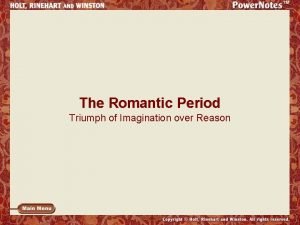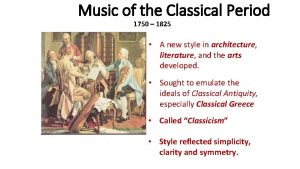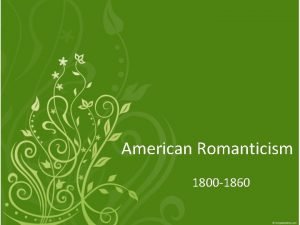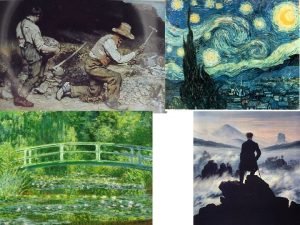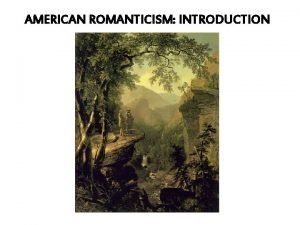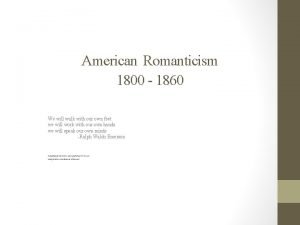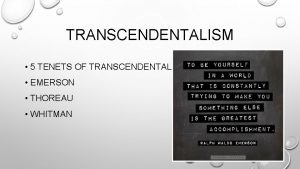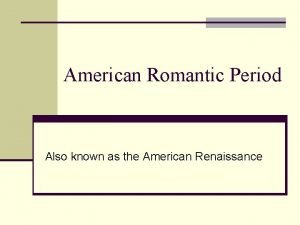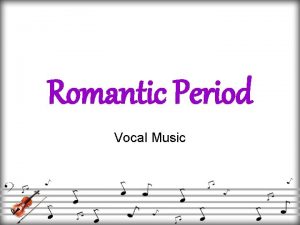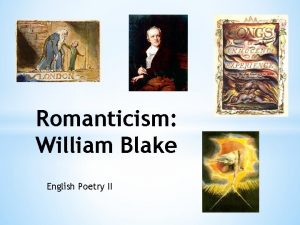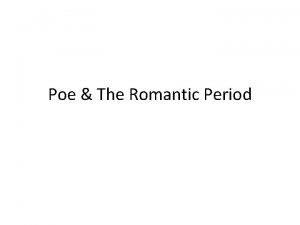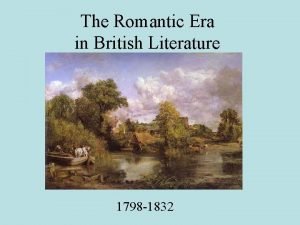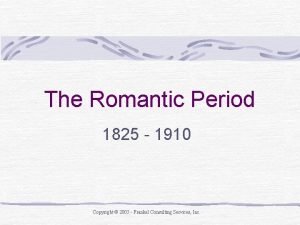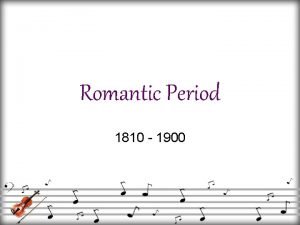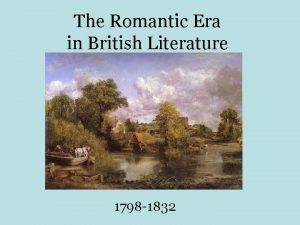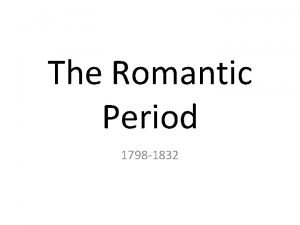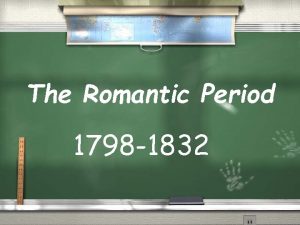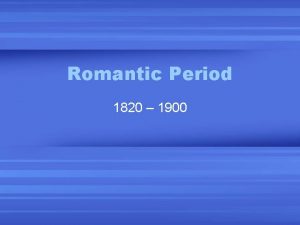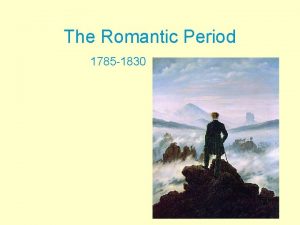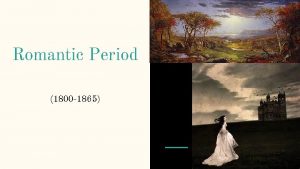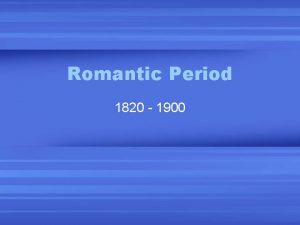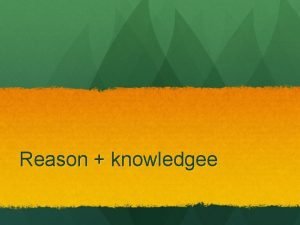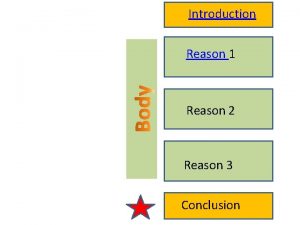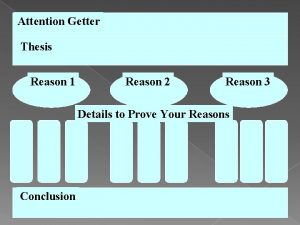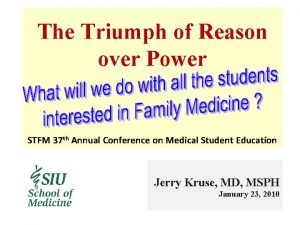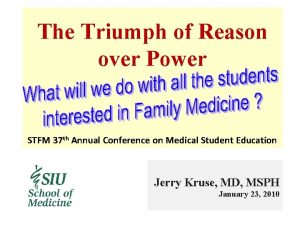The Romantic Period Triumph of Imagination over Reason
















- Slides: 16

The Romantic Period Triumph of Imagination over Reason

Don’t let the word romantic fool you! © K. J. Historical/CORBIS Romanticism is not related to love, romance novels, or Valentine’s Day.

What Is Romanticism? Romanticism is a philosophical, literary, and artistic movement that developed during the late eighteenth and early nineteenth centuries as a reaction against neoclassicism. • Neoclassicism valued • Romanticism valued • reason • emotion • order • imagination • harmony • intuition • restraint • freedom • balance • beauty of nature

The Beginning of Romanticism • As a philosophical movement • Romanticism began with the French Revolution in 1789. • As a literary movement • Romanticism began with the 1798 publication of Lyrical Ballads, with a Few Other Poems by William Wordsworth and Samuel Taylor Coleridge. • As an artistic movement • Romanticism began in the 1760 s and 1770 s as British artists began painting nontraditional subjects and experimenting with light and shade.

A Philosophical Movement Romanticism is the idea that • imagination and naturalness should be celebrated • one’s emotions and sense of will and identity should guide actions • nature is transformative—the human mind and nature “mirror” the other’s creative properties • individual liberties are essential and rebelling against tyranny is good • people should question tradition and imagine better ways to live

A Literary Movement Romantic literature • expresses personal experiences and emotions in simple, unadorned language • favors the lyric poem for expression of feelings, selfrevelations, and imagination • often turns to a magical past or inner dream world • celebrates the beauty and majesty of nature • redefines the role of the poet as • a “man speaking to men” • a bard, teacher, and prophet

An Artistic Movement Romantic art • reflects landscapes and the beauty of the natural world • emphasizes emotions, inspiration, and a dreamlike quality © National Gallery Collection; By kind permission of the Trustees of the National Gallery, London/CORBIS • usually omits scenes of industry Sun Rising Through Vapour: Fishermen Cleaning and Selling Fish probably before 1808 by Joseph Mallord William Turner

What Paved the Way for Romanticism? Revolution paved the way. • The British Industrial Revolution (1760– 1830) • The French Revolution (1789– 1799)

The Industrial Revolution • The Industrial Revolution created a miserable world for the working class. It • celebrated machinery and progress Mary Evans Picture Library • resulted in overcrowded cities, deplorable living conditions, and miserable working conditions

The Industrial Revolution • Romantic writers responded to the Industrial Revolution by emphasizing • the power of imagination as a force for change • the beauty and restorative powers of nature

The French Revolution • The beginning of the French Revolution • signaled the demise of tyranny and the rise of democratic principles • gave the Romantics hope that the world could change • Romantic writers responded to the French Revolution by emphasizing • individual liberty • the need to question tradition and authority

The French Revolution • However, the Romantics’ optimism was displaced by disillusionment as • the revolution turned more violent and Napoleon Bonaparte took power first as a dictator and then as emperor of France • England instituted repressive measures to keep radical principles and the “revolutionary fever” from spreading

Some Romantic Poets • William Wordsworth (1770– 1850) • “Lines Composed a Few Miles Above Tintern Abbey” • Samuel Taylor Coleridge (1772– 1834) • The Rime of the Ancient Mariner • George Gordon, Lord Byron (1788– 1824) • “She Walks in Beauty” • John Keats (1795– 1821) • “Ode to a Nightingale”

Romantic Legacies • Poetry and prose continue to use the everyday speech of common people. • The poet is still viewed as a creative individual whose work speaks to readers. • People are concerned about the impact of industry on the environment and quality of life.

What Have You Learned? 1. Romanticism is _______ movement. a. a literary b. an artistic c. a philosophical d. all of the above 2. Romantic writers valued a. reason c. imagination b. order d. balance 1. 3. The Industrial Revolution and French Revolution influenced the Romantic movement. 2. a. true b. false

The End
 The romantic triumph
The romantic triumph The classical period started from 1750 to 1872
The classical period started from 1750 to 1872 Qualities of romanticism
Qualities of romanticism Emotion over reason romanticism
Emotion over reason romanticism Values feeling and intuition over reason
Values feeling and intuition over reason Rationalism vs romanticism
Rationalism vs romanticism American romanticism 1800 to 1860 worksheet answers
American romanticism 1800 to 1860 worksheet answers 5 tenets of transcendentalism definition
5 tenets of transcendentalism definition American romantic period
American romantic period Vocal music of the romantic period
Vocal music of the romantic period Characteristic of romanticism
Characteristic of romanticism Romanticism dates
Romanticism dates British literature romantic period
British literature romantic period Characteristics of romantic period
Characteristics of romantic period Characteristics of the romantic period
Characteristics of the romantic period Romantic period
Romantic period The romantic age (1798 to 1824)
The romantic age (1798 to 1824)
